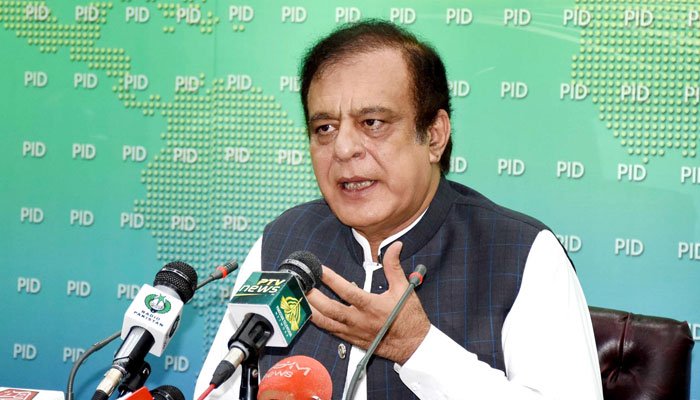Sindh thrusting incompetence upon federal government, says information minister Faraz
May 02, 2020

ISLAMABAD: Federal Minister for Information and Broadcasting Senator Shibli Faraz, in his first press conference since taking charge of the ministry, said that Sindh was thrusting incompetence upon the federal government in relation to the virus crisis, The News reported on Saturday.
Faraz said that the federal and Sindh governments were evolving consensus regarding the coronavirus situation. He assured reporters that the government would take all the federating units onboard to address the situation arising out of coronavirus.
Addressing the news conference in Islamabad on Friday, he said the nation was faced with an unprecedented challenge in the form of COVID-19, and a collective response was required to meet it.
Also read: Coronavirus of natural origin, says WHO
'Government envisioned smart lockdown'
“The government has envisioned the concept of smart lockdown to protect the daily wagers and labourers from the impact of coronavirus,” said the minister. He warned that the country could not afford a complete lockdown due to the economic situation.
Fielding questions about the Labour Day, the minister shared that the incumbent government was the first one to take practical steps for labourers in the form of temporary shelters and heath cards for the well-being and protection of the workers.
“It is owing to the empathy of Prime Minister Imran Khan for the workers and labourers that a mega Ehsaas Emergency Cash Programme was launched in the wake of coronavirus under which Rs12,000 are being disbursed amongst them,” said Shibli Faraz.
Also read: Remdesivir approved as experimental drug for coronavirus patients
'Sindh realised total lockdown not possible'
The minister pointed out that industries such as construction had also been reopened to provide opportunities to the workers to earn a livelihood. The minister, when asked about the situation in Indian Occupied Kashmir, said that the government has effectively highlighted the lingering dispute at the world forums including the United Nations.
The minister emphasised that Pakistan was mired in debt and if it opted for complete lockdown, the supply chain would not be complete and the daily business would come to a halt, which would have affect the weak segments of society the most.
He continued that the government of Sindh had also now realised that the total lockdown was not possible while other countries, including the United States, had also understood it despite having resources in abundance.
Also read: PPP lambastes Centre over non-provision of PPEs, demands premier step down
'Vital to adopt precautionary measures'
Replying to questions, he said that the government was making its efforts for the holding of the Parliament session and consultations with the opposition for finalisation of the standard operating procedures (SOPs) for summoning the session were in advanced stage.
He said that the government wanted that the session of the houses of the parliament should be held, but in the given situation, when Speaker National Assembly Asad Qaiser had been diagnosed with coronavirus, it was vital to adopt precautionary measures accordingly.
The minister contended that it was important to call the session of the Parliament, as certain bills were nearing lapse and their approval was necessary from the legislature.
"The opposition IS part and parcel of the political system and the government welcomes its role of constructive criticism, which proves helpful in improving governance and transparency," he said.
Also read: Over a quarter of Pakistan's women workforce fired or suspended amid lockdown: report
'There should be freedom with responsibility'
About press freedom, he said that the government supported media freedom. "There should be freedom with responsibility. Tension in the society or triggering sensationalism cannot be allowed in garb of media freedom," Faraz noted.
The minister said a policy was being formulated for the betterment of media workers and payment of outstanding dues to media houses were being done on war footing, ensuring that payments for one section of media did not land in any other’s hand.
"Under the policy, it would also be ensured that payment of outstanding salaries of media workers should be paid by the management of media houses and meetings have already been held in this regard. The ministry’s job is to provide a bridge between the government and the media," he remarked.
Originally published in The News





